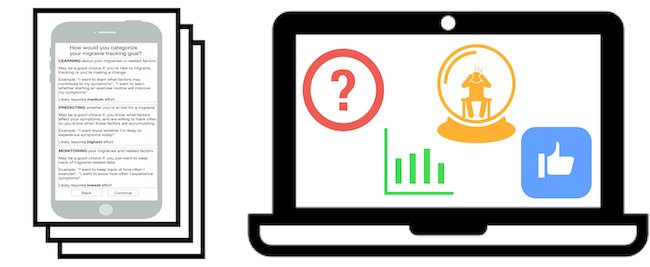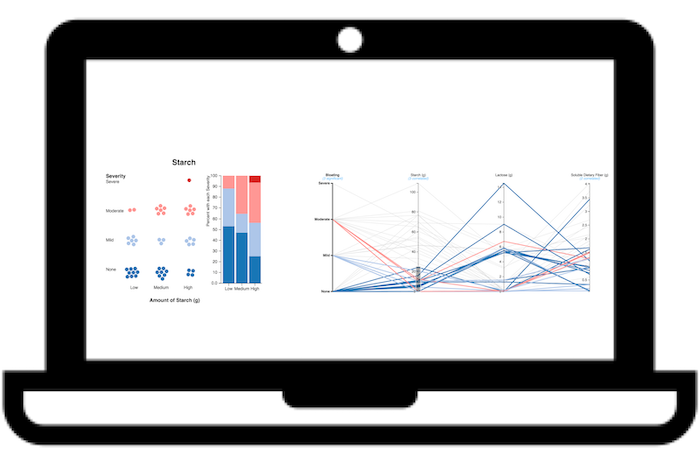Jessica Schroeder
jesscscs.washington.edu

Hello! I'm a recent computer science PhD graduate specialized in human-computer interaction at the Paul G. Allen School of Computer Science & Engineering. I'm advised by James Fogarty and Sean Munson. I received my undergraduate degree in computer science from Pomona College. I'm currently a Senior UX Researcher at Google.
My dissertation research focused on designing, developing, and evaluating tools that can help people and their health providers better understand and manage their personal health. I have extensive experience in conducting formative studies to identify needs and opportunities; iterative design and development of novel methods and tools to support those needs; and evaluations to examine usage and develop design implications for future tools. Throughout my PhD, I have surveyed more than 1,100 people; interviewed more than 100 people; developed interactive visualizations and mobile applications to better support personalized health; and conducted quantitative and qualitative analyses of survey, interview, and app usage data.
My multidisciplinary research has been supported by a National Science Foundation Graduate Research Fellowship; received a Best Paper Award (CHI 2017) and two Best Paper Honorable Mentions (CHI 2017, DIS 2018); and directly informed grants from both the National Science Foundation (IIS-1813675) and the National Institutes of Health (R01-LM012810).
More details on my research and approach can be found on:
Select Publications
More Information
Please see my Google Scholar and LinkedIn pages. I also have a Github page, but due to confidentiality concerns some projects are private.
Research Approach
My research focuses on helping individuals and their health providers better understand and manage their health. My general approach includes:

Formative Work through surveys and interviews to identify needs, challenges, and opportunities

Iterative Design and Development through prototypes and implementations to create tools that support people and providers

Evaluations through deployments with pre- and post-interviews to examine how those tools could be used
I have applied this approach to myriad health contexts, consulting and collaborating with health professionals throughout the process to draw on existing expertise within each context.
Download my research statement for a more in-depth summary of my projects.
Migraine: Supporting Goal-Directed Self-Tracking

My current research focuses on supporting self-tracking by people with migraine. People often track migraine-related data for a number of different goals (e.g., identifying migraine triggers, predicting future migraines, sharing data with health providers), but current tools do not explicitly support the goals people want to pursue. I am currently investigating goal-directed self-tracking, a new approach for supporting every stage of self-tracking. I aim to help people: track exactly and only what they need to achieve their goals; appropriately interpret and act on their data with respect to those goals; and share their data with their health providers. This work is being done in collaboration with the UW Headache Clinic.
My investigation of supporting goal-directed self-tracking for migraine management has included the following projects:
- I conducted surveys and interviews with people with migraine and health providers to investigate challenges, needs, and opportunities in migraine tracking and identify specific categories of migraine tracking goals people often want to pursue (see our paper)
- I created a paper prototype and used it in interviews with people with migraine and health providers to investigate how goal-directed self-tracking could help support people in tracking exactly and only what they need to track to achieve their goals (see our paper)
- I am currently advising on an ongoing project to implement my goal-directed self-tracking tool for a feasibility study to examine how it could support all stages of self-tracking
Mental Health: Supporting Behavioral Therapy

As an intern at Microsoft Research, I worked with Mary Czerwinski and a team of HCI experts, clinical psychologists, and mobile app designers and developers to develop and evaluate Pocket Skills, an app designed to provide holistic support for Dialectical Behavioral Therapy (DBT). DBT is a type of behavioral therapy designed to treat complex, difficult-to-treat disorders and suicidal ideation. We aimed to support people in learning, practicing, and implementing DBT skills to help them solve problems, maintain relationships, and navigate negative events and emotions.
My investigation of supporting behavioral therapy has included the following projects:
- I conducted a feasibility study to evaluate how Pocket Skills could help people engage with their DBT and manage their mental health conditions (see our paper)
- I performed a quantitative analysis of our feasibility study data to examine the relative effectiveness of particular skills, developing data-driven design implications for translating evidence-based therapies into mobile applications and identifying opportunities for machine learning techniques to provide personalized and context-aware skill suggestions (see our paper)
Irritable Bowel Syndrome (IBS): Supporting Trigger Identification

My earlier work focused on supporting IBS trigger identification. People with IBS experience gastrointestinal symptoms that are often caused by personalized food triggers (i.e., different foods are more or less problematic for different individuals). Providers often advise people with IBS to record their food and symptoms in journals to attempt to find correlations, but lack the time and tools necessary to interpret the resulting data. I worked with a multidisciplinary team of health and technology researchers to investigate how to help people with IBS and health providers identify personalized IBS triggers. We aimed to support lower-burden data collection; actionable data interpretation; and patient-provider collaboration.
My investigation of supporting trigger identification has included the following projects:
- I developed analyses to identify correlations between an individual’s nutrients and symptoms from a food and symptom journal (see our paper)
- I designed, developed, and evaluated interactive visualizations to help people and health providers explore relationships between the foods they eat, the nutrients those foods contain, and the symptoms that were correlated with those nutrients (see our paper)
- I collaborated in a project a colleague led to design, develop, and evaluate an app that supports self-experimentation, or scientifically rigorous n-of-1 experiments people can perform to determine causality between an trigger and subsequent symptoms (see our paper)
- I proposed analyzing self-experimentation data via Bayesian methods, which could allow us to better answer the types of questions people often have for their self-experimentation data (see our paper)
- I collaborated in a project a colleague led to design, develop, and evaluate a system that supports taking photos of food; augmenting those photos with lightweight manual tracking; and visualizing the data, via our previously-developed visualizations and new ones (see our paper)
- I am currently collaborating in a project a junior student is leading to investigate how Bayesian network learning could provide a more understandable and actionable analysis of symptom and trigger data
More Information
Please see my Google Scholar and LinkedIn pages. I also have a Github page, but due to confidentiality concerns some projects are private.
Download my full academic CV or see my Google Scholar or LinkedIn pages for more information.